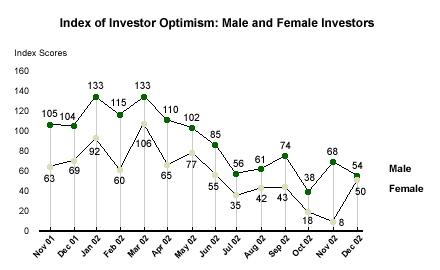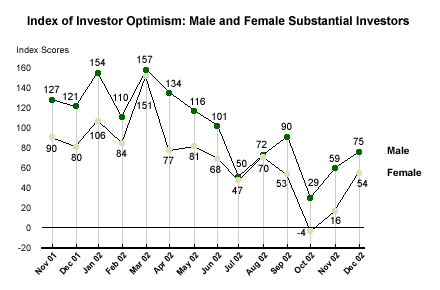Female investors became much more optimistic in December, according to the Index of Investor Optimism -- a joint effort of UBS and The Gallup Organization*. Overall optimism among female investors surged 42 points in December and now stands at 50. In sharp contrast, overall optimism among male investors fell 14 points to 54. Those opposing trends bring overall optimism among male investors and female investors to just about the same level as 2002 comes to a close.
Why did female investor optimism surge upward while male optimism declined? Do women feel more optimistic as the holidays approach and men less so? Is it normal for investors of both genders to be about equally optimistic about the investment climate?
Female Investors Become More Optimistic
The overall Index of Investor Optimism among all investors is at 52 -- up 11 points from last month's 41 and 23 points from October's low of 29 -- its lowest point since the Index's inception in October 1996. Although the Index has almost doubled over the past two months, investor confidence remains weak. It is now at virtually the same low level as it was at in September 2001.
Over the Index's six-year history, women have almost always tended to be less optimistic than men. This has been the case at all times of the year, including the year-end holidays. If the holidays affect the genders differently, it has not been reflected by an annual surge in optimism among women investors.
Men were much more optimistic than women in both November and December of last year. In December 2001, the Index among male investors was 104, essentially the same as it had been in November (105). The Index among female investors was 69 in December 2001 -- also close to its November level of 63.
The situation was similar in 1999 and 2000 -- male investors were more optimistic than female investors in both November and December of each year. In December of 1999, optimism among male investors surged 35 points higher -- from 155 to 190 -- while optimism among women increased much more modestly from 140 to 155. Obviously, it doesn't appear that the holidays consistently make female investors more optimistic than their male counterparts.

Substantial Female Investors Also Become More Optimistic
Investor optimism also increased among "substantial" investors -- those with $100,000 or more of investable assets -- during December. The overall Index of Investor Optimism for substantial investors is now at 66 -- up 25 points from November (41) and 49 points from October (17). Even with these large increases, the substantial investor Index remains below where it was last December (106) and far below where it was in March (155) of 2002.
Although the Index for substantial investors is somewhat volatile when looked at by gender -- the sample sizes are comparatively small -- it is clear that optimism surged among women in December. The overall substantial investor Index among women increased from 16 in November to 54 in December. Despite this surge, substantial investor optimism remains lower among women than among men. The substantial investor Index among men also increased, but more modestly, from 59 in November to 75 in December.

Key Points
Whether or not men and women react differently to the holidays, the data do not support the notion that the December surge in optimism among female investors is related to this time of year. It may be that women have simply been more successful investors than men in 2002, and this has made them comparatively more optimistic. The fact that the Personal Dimension of the Index is now higher for women (55) than men (46) lends support to such a hypothesis. Of course, the fact that the equity markets have largely held on to their gains since October, may have also played a role in increasing optimism among female investors.
Whatever the reasons for the surge in female investor optimism this month, let's hope that it continues in the months ahead. Even after two months of increases, the overall level of investor confidence among both men and women remains even weaker than it was a year ago. Investor confidence must continue to improve if we are going to have a better economy in 2003.
*Results for the total dataset are based on telephone interviews with 1,000 investors, aged 18 and older, conducted Dec. 1-15, 2002. For results based on the total sample of investors, one can say with 95% confidence that the margin of sampling error is ±3%. For results based on the sample of 400 substantial investors, the maximum margin of sampling error is ±5%.

